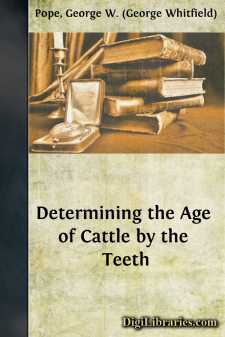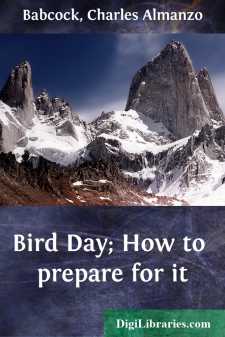Nature
Nature Books
Sort by:
by:
Anonymous
OUR PETS. This is Pol-ly's own cat, Top-sy. She looks ve-ry prim and quiet; but if you play with her, you will find she is a ve-ry mer-ry lit-tle cat. She will jump up-on the ta-ble at break-fast, and run off with Pol-ly's toast; and if mam-ma be wri-ting a let-ter, Top-sy will steal soft-ly a-long the arm of the so-fa, and rub her paw o-ver the last word mam-ma has writ-ten, and make a great...
more...
by:
Charles Copeland
I. FOX-WAYS. Did you ever meet a fox face to face, surprising him quite as much as yourself? If so, you were deeply impressed, no doubt, by his perfect dignity and self-possession. Here is how the meeting generally comes about. It is a late winter afternoon. You are swinging rapidly over the upland pastures, or loitering along the winding old road through the woods. The color deepens in the west; the...
more...
by:
John Burroughs
JOHN BURROUGHS John Burroughs was born April 3, 1837, in a little farmhouse among the Catskill Mountains. He was, like most other country boys, acquainted with all the hard work of farm life and enjoyed all the pleasures of the woods and streams. His family was poor, and he was forced at an early date to earn his own living, which he did by teaching school. At the age of twenty-five he chanced to read...
more...
by:
Ithamar Howell
Page 3 INTRODUCTION OFFICE OF THEBUREAU OF STATISTICS, AGRICULTURE AND IMMIGRATION,OLYMPIA, WASHINGTON, JUNE 1, 1909. This publication represents an effort to place before the general public, and particularly the visitors at the Alaska-Yukon-Pacific Exposition, a brief description of the principal resources and industries of the State of Washington. Its imperfections may be accounted for largely by...
more...
CHAPTER I. Jenny Wren Arrives. Lipperty-lipperty-lip scampered Peter Rabbit behind the tumble-down stone wall along one side of the Old Orchard. It was early in the morning, very early in the morning. In fact, jolly, bright Mr. Sun had hardly begun his daily climb up in the blue, blue sky. It was nothing unusual for Peter to see jolly Mr. Sun get up in the morning. It would be more unusual for Peter...
more...
DETERMINING THE AGE OF CATTLE BY THE TEETH. The age of cattle can be approximated closely by the appearance, development, and subsequent wear of their second incisor teeth. Cattle have eight incisor teeth, all in the lower jaw. In the calf at birth two or more of the temporary or first incisor teeth are present. With the first month the entire eight incisors have appeared.Fig.1.—Internal face of...
more...
PREFACE The value of Knowledge and Character is duly impressed upon us. Of the value of Freedom we are told so much that we have come to regard it as an end in itself instead of only a means, or necessary condition. But Beauty we are half-inclined to connect with the effeminate. Poetry, Music, and Literature are under suspicion with the average English schoolboy, whose love of manliness he will share...
more...
by:
Cecil Smith
BIRDS OF GUERNSEY. 1. WHITE-TAILED EAGLE. Haliaeetus albicilla, Linnsaeus. French, "Aigle pygarque," "Pygarque ordinaire."—The White-tailed Eagle is an occasional but by no means uncommon visitant to all the Islands. I have seen specimens from Alderney, Guernsey, and Herm, and have heard of its having been killed in Sark more than once. It usually occurs in the autumn, and, as a rule,...
more...
PREFACE During these days of ceaseless conflict, anxiety and unrest among men, when at times it begins to look as if "the Caucasian" really is "played out," perhaps the English-reading world will turn with a sigh of relief to the contemplation of wild animals. At all events, the author has found this diversion in his favorite field mentally agreeable and refreshing. In comparison with...
more...
HISTORY OF THE MOVEMENT FOR "BIRD DAY" In the spring of 1894 the writer's attention was attracted to the interest of the children in that part of their nature study which related to birds. Their descriptions of the appearance and habits of the birds they had observed were given with evident pleasure. They had a strong desire to tell what they had seen, not in the spirit of rivalry, but...
more...











